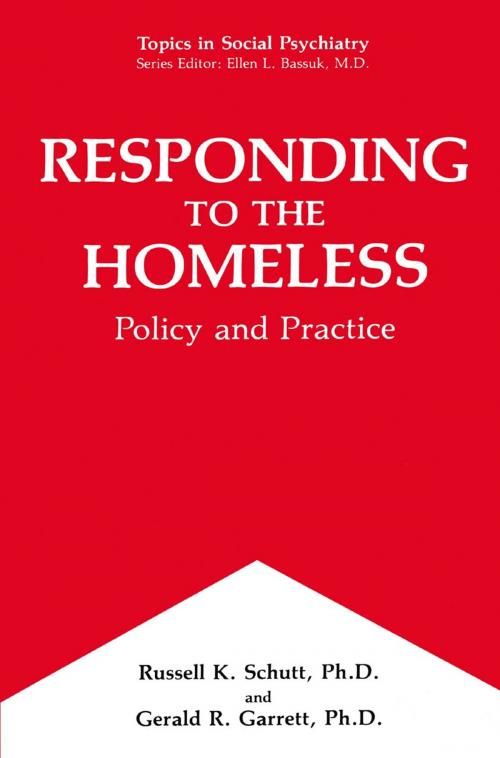Responding to the Homeless
Policy and Practice
Nonfiction, Health & Well Being, Medical, Reference, Public Health, Specialties, Psychiatry| Author: | Russell K. Schutt, Gerald R. Garrett | ISBN: | 9781489910134 |
| Publisher: | Springer US | Publication: | November 21, 2013 |
| Imprint: | Springer | Language: | English |
| Author: | Russell K. Schutt, Gerald R. Garrett |
| ISBN: | 9781489910134 |
| Publisher: | Springer US |
| Publication: | November 21, 2013 |
| Imprint: | Springer |
| Language: | English |
Responding to the Homeless: Policy and Practice is largely a product of a unique collaboration between Russell K. Schutt and Gerald R. Garrett and their Boston community. As such, it offers a rich perspective on the problem of homelessness that is derived from the authors' shared experience with researchers, academics, students, providers, policymakers, and homeless persons themselves. Schutt and Garrett take the reader into the shelters and acquaint him or her with the philosophical and practical dilemmas facing line workers as well as policymakers. They also take the reader into the community to better understand the housing market and the dysfunctional continuities among shelter, housing, treatment, and social supports. There are sensitive discussions of the salient health problems that too commonly touch the lives of homeless individuals, such as substance abuse and AIDS. The volume also includes clear descriptions of the sometimes elusive processes of counseling and case management for homeless individuals. The sidebars of "what to do" and "what not to do" contain useful information that will both inform and empower individuals who are working on the front lines, and inspire and prepare future caregivers. While the eminently readable organization and style of the book are sugges tive of a highly practical handbook on the basics of homelessness, the authors and their contributors have also produced a scholarly volume that is replete with current research findings, programs descriptions, case studies, and vignettes.
Responding to the Homeless: Policy and Practice is largely a product of a unique collaboration between Russell K. Schutt and Gerald R. Garrett and their Boston community. As such, it offers a rich perspective on the problem of homelessness that is derived from the authors' shared experience with researchers, academics, students, providers, policymakers, and homeless persons themselves. Schutt and Garrett take the reader into the shelters and acquaint him or her with the philosophical and practical dilemmas facing line workers as well as policymakers. They also take the reader into the community to better understand the housing market and the dysfunctional continuities among shelter, housing, treatment, and social supports. There are sensitive discussions of the salient health problems that too commonly touch the lives of homeless individuals, such as substance abuse and AIDS. The volume also includes clear descriptions of the sometimes elusive processes of counseling and case management for homeless individuals. The sidebars of "what to do" and "what not to do" contain useful information that will both inform and empower individuals who are working on the front lines, and inspire and prepare future caregivers. While the eminently readable organization and style of the book are sugges tive of a highly practical handbook on the basics of homelessness, the authors and their contributors have also produced a scholarly volume that is replete with current research findings, programs descriptions, case studies, and vignettes.















